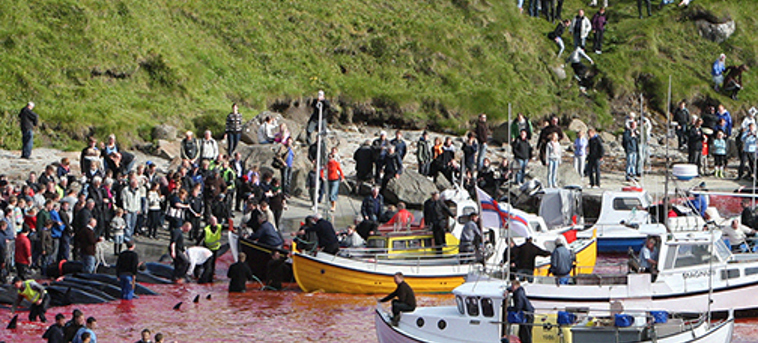
Questions & Answers
Are pilot whales an endangered species?
No. The total number of pilot whales taken in the Faroe Islands can fluctuate from one year to the next. The average catch of around 600 whales a year is not considered to have a significant impact on the abundance of pilot whales. The pilot whale population in the area around the Faroe Islands is estimated to be 100,000 animals.
Is the pilot whale hunt an annual festival?
Whale drives are not an annual festival or ritual, as is often wrongly claimed. Whale drives in the Faroe Islands take place to provide food, and can happen at any time of the year. The driving, beaching, killing and distribution of pilot whales are fully regulated by law and regulations. Catches are shared among the participants and local community.
Is pilot whale killing commercialized?
No. The catch is distributed for free in the local community where a catch takes place. This traditional community-based sharing of catches also ensures that the larger the catch, the more people get a share of it. However, in some supermarkets and on the dockside, whale meat and blubber is occasionally available for sale.
Do pilot whales suffer when they are killed?
Faroese animal welfare legislation, which also applies to whaling, stipulates that animals must be killed as quickly and efficiently as possible. Whales are killed on the shore and in the shallows of bays especially suited and authorized for the purpose, under the supervision of locally elected officials and by people with a required license.
Is whale meat and blubber contaminated?
The high levels of mercury/methyl mercury as well as other contaminants deriving from global industry, such as PCB and DDT in pilot whale meat and blubber, are well documented and are continually monitored.
Why do the Faroese eat contaminated whale meat and blubber?
Faroese people are well aware of the risks associated with consuming too much pilot whale meat and blubber. The health authorities have made recommendations on the safe limits of consumption, and people have taken these on board. For example, pregnant women are advised not to eat whale meat and blubber.
Is the contamination a big issue in the Faroe Islands?
Contaminant levels in pilot whales are a matter of considerable concern to the Faroese, who are so dependent on the sea and its resources. That is why the elimination of pollutants at their source should be the major focus of governmental cooperation and campaigns to ensure binding international commitments to clean up the oceans that are our common heritage.
SUSTAINABLE
REGULATED
NATURAL
COMMUNAL
FOOD


